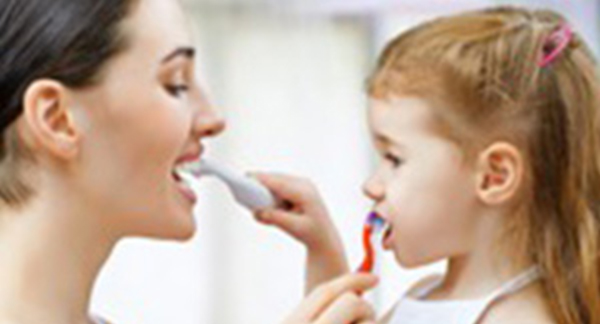Normanhurst NSW 2076, Australia
After hours (Available by Appointment)

Often parents are forced to deal with the situation where their children do not like brushing or resist brushing their teeth. This leaves parents disappointed and frustrated. Toddlers especially pose a challenge.
Be a role model
Become a role model for your child- toddlers love copying everything their parents do!
Start by buying identically coloured toothbrushes for them and yourself. Next, sit with your child on the bathroom floor so they can see what you’re doing with the toothbrush and will try to mimic it. Use a cup for rinsing and a bowl or the bathtub for spitting; each time your toddler puts the brush in their mouth, they earn the right to spit (undoubtedly a toddler’s favourite part of the process!).
Brush every day and night in front of your child to let them know that brushing is an essential part of the daily routine. You can dance or sing while brushing to make it a fun activity. Sometimes children perceive brushing as an unpleasant experience and may even develop a fear of brushing which can lead to phobia of dental treatment. To avoid this, it is important for them to realize that tooth brushing is an integral part of their day.
Do you want to know more about your child’s teeth?
Click on the link below-
A healthy family habit
Night time brushing can be practiced as a family activity. One parent can brush the other parent’s teeth. This will make the child understand that parents can brush their teeth. You can even let your child brush your teeth. Never skip brushing at night. This will make them realize that it is a daily ritual which cannot be skipped.
You can brush in front of the mirror; this will make the child realize that it is not a boring activity.
Choosing a toothbrush
For younger children, use a soft bristle toothbrush. The size of the toothbrush head should suit your child’s age. If a large sized toothbrush is chosen for a small child then it may hurt the child at the back of mouth. This could prompt your child to resist tooth brushing.
Electric toothbrushes may be used for children but they should be used properly. The bristles of electric toothbrushes have their own motion; hence they should be kept on the surface of each tooth for few seconds.
For an infant, a finger brush may be used till their molars start growing. A finger brush slides on the finger of a parent and help them brush their infants teeth easily.
Choosing toothpaste
A child less than 3 years old should use non-fluoride toothpastes because children of this age tend to swallow toothpaste. For children in the age group of 3-6 years, kids toothpaste may be used which has fluoride though in small quantities (450-500ppm). A child older than 6 years old can use regular fluoridated toothpaste. Fluoride is important for teeth as it makes enamel stronger and resistant to decay.
Use whatever toothpaste they like most — this may have more to do with what’s on the tube than in it. No matter what kind is chosen, though, be careful to use only a tiny dab and store it out of reach. It may also help to name each tooth while brushing so no tooth is left out. To begin with, you could also forgo using toothpaste, as sometimes children do not like the taste of toothpaste.
Parental involvement
Let your toddler climb up on a footstool (with you behind them for safety). While looking at your reflection, point to and count their teeth and yours. Then touch each tooth with the brush “to give it its share of toothpaste.”
p>Do you want to know more about your child’s teeth?For any other queries contact us at www.normanhurstdental.com.au or call us on 02-99898565